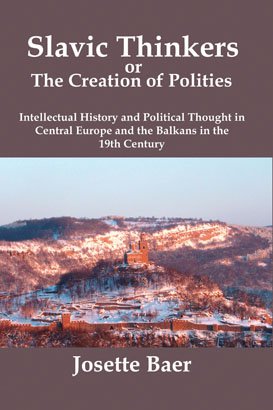
About the Author
Josette Baer is a lecturer of political thought in the Department of Philosophy at the University of Zurich. She is the author of Preparing Liberty in Central Europe (2006) and Politik als praktizierte Sittlichkeit. Zum Demokratiebegriff bei T.G. Masaryk und Václav Havel (1998). Her articles appeared in Balkanistica, Democratisation, East Central Europe-L’Europe du Centre-Est, Studies in East European Thought and Swiss Political Science Review.
SLAVIC THINKERS OR THE CREATION OF POLITIES: Intellectual History and Political Thought in Central Europe and the Balkans in the 19th Century
Josette BaerNew Academia Publishing, 2007
252 Pages, 6 Illustrations
ISBN 978-0-9794488-0-5 Paperback
For BULK ORDERS, order directly from New Academia Publishing.
Queries: orders@newacademia.com
About the Author
Josette Baer is a lecturer of political thought in the Department of Philosophy at the University of Zurich. She is the author of Preparing Liberty in Central Europe (2006) and Politik als praktizierte Sittlichkeit. Zum Demokratiebegriff bei T.G. Masaryk und Václav Havel (1998). Her articles appeared in Balkanistica, Democratisation, East Central Europe-L’Europe du Centre-Est, Studies in East European Thought and Swiss Political Science Review.
About the book
What is political culture? Does political culture affect democratization, and if so, what method could make such analysis feasible?
Research on cultural aspects of the various exit strategies of recent and prospective EU members has focused on the cultural thesis that views religion as principal factor for a successful democratization. Baer’s comparative and interdisciplinary study addresses the hitherto sparsely researched aspect of political culture with a detailed analysis of the political thought of six Slavic intellectuals, who were crucially involved in nation- and state-building.
The analytical portrait of the region’s intellectual history, as a subfield of Eastern European history, allows drawing new conclusions about democratization that can help to explain the different paths the states chose after 1989. Baer’s study provides a political culture hypothesis and a method tailored to post-communist transition and offers a new theoretical contribution to democratization studies.
Praise
“The theme and especially the comparative approach are gripping.”
– Ivanka N. Atanasova, George Mason University.
“This work is solid intellectual history and has the merit of taking on Samuel Huntington’s contention that religion is the key determinant in the development (or lack thereof) of democratic political cultures in East Central Europe.”
-T. Mills Kelly, George Mason University.





 Coming Soon
Coming Soon Awards
Awards